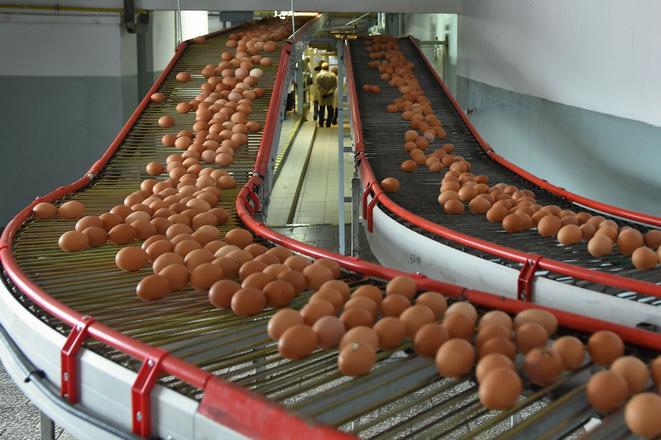Egg prices, unlike butter, have seen a marked decline recently. Early last year, a pack of 10 eggs cost over €3; today, it is priced at around €2.
This drop stems from a reduction in farmgate prices among laying hen breeders. “The main drivers were the fall in feed prices and a decline in electricity and gas costs, all of which significantly impact production expenses,” Daniel Molnár, head of the Slovak Poultry Union, told Hospodárske noviny.
However, egg prices could rise again in the run-up to Christmas, a period of high demand. The culprit: avian flu. Slovakia’s largest egg farm, located in Dvory nad Žitavou near Nové Zámky and operated by Novogal, has been affected. The State Veterinary and Food Administration (ŠVPS) confirmed the presence of the virus after 500 hens perished on the site last Tuesday.
Poultry farms near Dvory nad Žitavou are now prohibited from temporarily selling their eggs and meat. More concerning is the ongoing cull of hens across the entire Novogal farm, with a total of 400,000 hens set for slaughter.
The virus spread quickly beyond the initial barn, according to ŠVPS, with the farm reporting over 50,000 dead hens by last Thursday. Operations are underway to cull the remaining stock using a gas chamber.
Cases of avian flu have emerged across Europe, including near the Czech-Slovak border in the Czech town of Hodonín.
Fiscal plan will impact egg prices in 2025
Novogal supplies around 180 million eggs to the market annually, covering about 15 percent of Slovakia’s consumption. Most of these are produced at Dvory nad Žitavou, with a smaller facility in Levice housing around 200,000 hens, reports Denník N. As a result, Slovakia faces a temporary shortfall exceeding one-tenth of its egg consumption.
Some stores have already run out of eggs or are close to running out, but the situation should improve in the coming days. Replacing eggs from abroad may not be straightforward, as avian flu has also affected other European countries.
Additionally, Novogal, owned by the family of the late Komárno agro-entrepreneur Jozef Öszi, a prominent figure in Slovak agriculture since the fall of socialism, is also a major domestic poultry producer. Consequently, Slovakia will experience a temporary decrease in poultry meat supply as well.
A broader crisis looms should the virus continue to spread, given the agricultural strength of the Dvory nad Žitavou area.
Moreover, poultry farmers and processors anticipate that measures from the recent fiscal consolidation package will drive up production costs for live poultry, poultry meat, and eggs. “These increased costs will need to be reflected in our farmgate prices next year,” announced Molnár. A part of the consolidation plan includes an adjustment to the VAT rate on staple foods, which will drop from 10 percent to 5 percent. Eggs, however, are not currently included on this list, meaning they remain subject to a 20 percent tax rate, set to decrease to 19 percent from January 1.
Prime Minister Robert Fico has hinted that eggs may be classified as a staple food following a potential review of the list, which could happen as early as next year.



 Eggs are transported by conveyor from the large-scale laying hen farm to the sorting facility at Hydina Holding in Kežmarok on October 2, 2018. (source: TASR - Oliver Ondráš)
Eggs are transported by conveyor from the large-scale laying hen farm to the sorting facility at Hydina Holding in Kežmarok on October 2, 2018. (source: TASR - Oliver Ondráš)